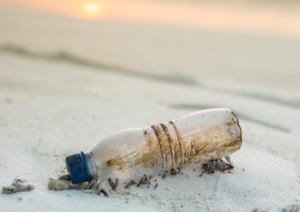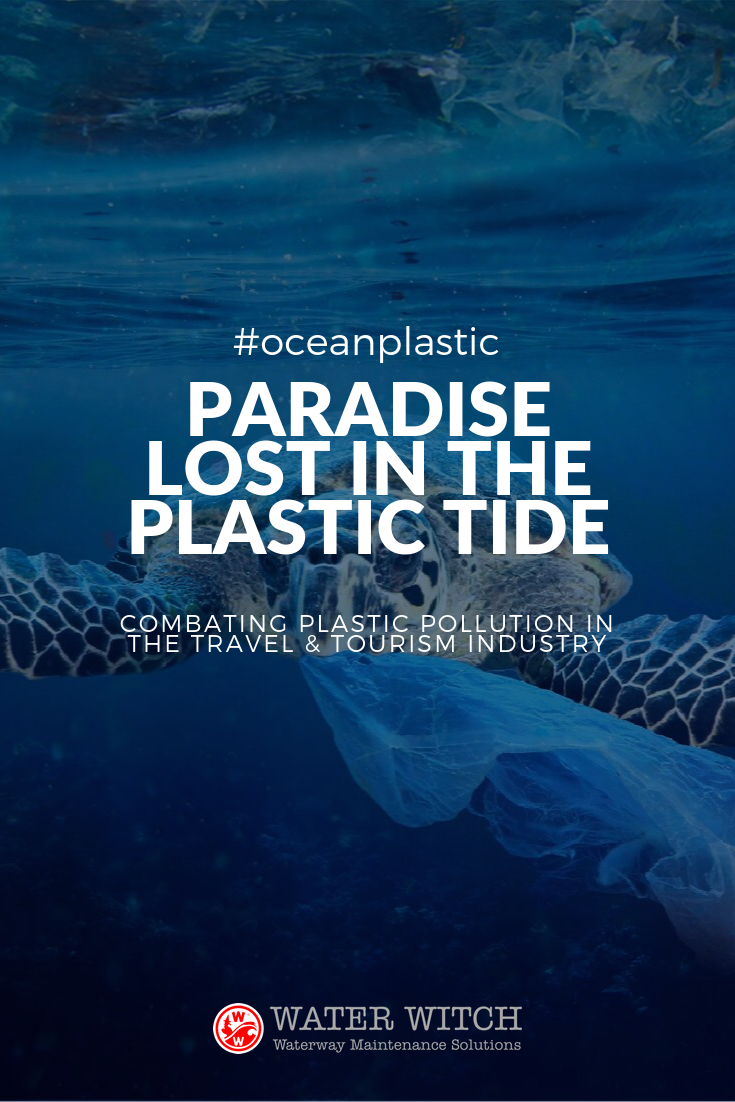Paradise Lost In The Plastic Tide. To make our beaches and sea cleaner, the travel and tourism industry needs to work on combating plastic pollution in the ocean.
 There used to be a time when I sat on a beach on a distant shore and wished for a bottle to wash ashore so I could check it for a message. Now, you are likely to go to the beach and find it littered with debris and plastic bottles. Because of plastic pollution in the ocean, even the most remote islands on the planet are now saturated in plastic.
There used to be a time when I sat on a beach on a distant shore and wished for a bottle to wash ashore so I could check it for a message. Now, you are likely to go to the beach and find it littered with debris and plastic bottles. Because of plastic pollution in the ocean, even the most remote islands on the planet are now saturated in plastic.
The message being washed up on our shores these days is that our marine environment is choking in plastic pollution. Pristine beaches and white sands scalloped with palm trees are fast becoming a thing of the past.
With 13 million tonnes of plastic ending up in the ocean every year, almost every marine animal and marine environment from the surf to the ocean trench will soon be contaminated with plastic. By 2050 we will have more plastic than fish. You can see the extent and clustering of plastic pollution in the ocean, particularly around coastal regions, in Litterbase’s interactive map.
Desert Island Disaster
For tourists, the reality is that we will experience more sun, less sea and more plastic. Unless we can make the sea cleaner, going to the beach, going diving or enjoying the coastal wildlife will soon become a thing of the past.
Our popular “tourist traps” are now trapped and wrapped in plastic.
- Scientists predict that 90% of coral reefs will die by 2050 if we don’t take drastic action to stop it.
- One million seabirds and a 100k marine animals are killed each year. The survival of nearly every species is at risk.
- Beaches in Indonesia, the Philippines, Thailand and Greece are currently engulfed in plastic waste.
- Henderson Island, a once stunning desert island in the Pacific Ocean, is at the centre of the South Pacific Gyre (an ocean current that pulls debris from South America into a circular current, creating a huge area of plastic pollution in the ocean). This remote UNESCO site and British owned island is the most polluted place on the planet.
Paradise and Profits Lost
As well as the cost to marine life and our ecosystem, plastic pollution in the marine environment has a big impact in terms of lost tourism revenue. Tourism makes up 12% of global GDP and a staggering 1 in 10 jobs worldwide. 80% of all tourism is related to our coastal regions. It is also the lifeblood for many developing countries.
Plastic pollution in the ocean also contributes to the devaluation of waterfront properties and reduction in visitors and beach-goers. The Island of Goeje in South Korea lost $37 million in revenue due to marine pollution on the beaches. It is estimated that marine pollution has cost the Asian Pacific Economic Cooperation (APEC) region – $622 million. In the UK, lost tourism revenue and clean-up costs totalled £11 million a year – just for the Kent coastline alone.
What is the travel industry doing to reduce plastic pollution in the ocean?
The travel and tourism industry is simultaneously a victim and a villain of plastic pollution. Without taking drastic steps to reduce plastic dependency and reduce waste, the industry risks its very existence and the livelihoods of the 13 million people employed within it.
Thankfully, many stakeholders have already started to make a change.
The major airlines are also taking a stand against plastic. Delta, Alaska, American, Virgin Australia, Ryanair and United Airlines are all attempting to phase out the easier single-use plastics like stirrers and plastic straws.
ABTA has also made a commitment to reducing plastic waste in its “Make Holidays Greener” campaign. Hilton, Marriott International, Royal Carribean, MSC Cruises, P&O, Cunard and Walt Disney are also taking stock of their plastic pollution by banning straws, stirrers and cups.
There is a fear that this may all be a greenwashing stunt and the demonising of one product is not enough. There needs a holistic approach. One that incorporates procurement, management, energy efficiency, reporting, certification etc. The Soneva hotel chain in the Maldives and Thailand have tried this though their use of sustainable materials, recycling programme, composting, water conservation, solar energy and protecting both their biodiversity and local communities. It is a philosophy that makes their hotel chain part of the environment in every way.
Is it enough?
The travel and tourism industry are one of the major stakeholders in the marine environment and should be leading the way in revolutionising our use of plastic. Eco-tourism can no longer be a niche market. All tourism needs to be eco-tourism.
While committing to reduce single-use plastic is commendable, what is needed is political, business and consumer will, all focused on making our global economy plastic free, reusable or biodegradable. A complete global consumption redesign.
However, the entire tourism supply chain can start making these systemic changes now.
So how can travel and tourism companies better manage their impact on the marine environment and make the sea cleaner?
Disposable consumerism and plastic is a global problem affecting all industries. However, small changes in an industry as large as tourism could make a difference to plastic pollution in marine environments.

Reduce solid waste generation
This involves removing single-use plastic and either replacing with compostable or reusable options. Reducing reliance on paper; paper tickets, printed receipts etc. Switching to sustainably sourced foods and increasing composting.
Switch to renewable energy
The World Travel and Tourism Council (WTTC) has recently signed up to the UN Climate Neutral Now initiative with the aim of reducing 50% of travel and tourism related emissions by 2035. The industry needs to keep the focus on reducing its share of greenhouse gas emissions and better ways of offsetting carbon usage in all areas from using electric powered vehicles in rental companies to zero emission transport in hotels.
Promote Zero Waste tourism practices
Installing water fountains, selling reusable drinking containers, promoting reusable bags and toiletries are all practical steps companies can take to reduce reliance on plastic products. When presented with a viable alternative, most travellers will now make the eco-choice but holidaymakers are often not even given the option of going plastic-free. Challenging plastic consumerism around travel is key to stemming the tide of plastic entering our waterways and oceans.
Market sustainability through effective marketing
Tackling tourism marketing is also essential. Especially with the growing popularity of “last-chance” tourism putting even greater strain on sites like the Florida Keys and Great Barrier Reef.
Sustainable tourism needs effective sustainability marketing to support it. It needs to be portrayed as affordable and desirable, and not as the preserve of the rich eco warriors. According to Zavier Font, communicating sustainability needs to be more than look at my green logo and offsetting. It needs to be intrinsic to customer experience. It needs to be more that “Look at me I am sustainable”, and instead “tell them something the company does sustainably that will help the customer achieve x.” Make it about the customer and not about the company. According to Font, your entire website should be “oozing sustainability”.
Support industry standardisation
“What we need is for industry associations to get behind these individual actions [by tour operators, etc.] and introduce industry-wide standards as a requirement to be a member of the association. We need whole destinations to act on this. We are not there yet.”
Xavier Font, Sustainability Marketing, University of Surrey
We already have a few UK standards like Blue Flag, Clean-Marina, Adopt-a-beach and Surfers Against Sewage and Quality Coast Awards, but more needs to be done in the developing world and in Asia. There are glimmers of hope in the “Green Hotelier” The UN World Tourism Organisation is currently working on sustainability standards that can be applied to the tourism industry.

Beach Cleans
Organising manual clean-ups can be an effective way not just to stem the tide of marine pollution, but also to raise consciousness and help change behaviours.
Including clean-ups as part of outdoor activities is becoming increasingly popular with companies like My Green Trip partnering with big hitters like Airbnb to promote sustainable tourism. Or what about plastic fishing with The Plastic Whale in Hamburg?
Tourist activities can be given a social purpose. Using a mechanised, easy to pilot sea cleaner boat or pontoon boat can help make manual clean ups more effective.
Infrastructure Investment
Investing in better waste management on waterfronts, harbours and beaches can all help improve waste behaviours and collection, which all help make the sea cleaner.
Inland waste management
Ensuring waterways, rivers and harbours are also kept clean of plastic pollution is also vital to preventing further pollution of our oceans. The best way to make the sea cleaner is by stopping plastic getting in the ocean in the first place should be a major priority for anyone managing a port, harbour, beach or river.
Water Witch works with stakeholders across the industry to ensure waterways are maintained and pollution free to keep tourists coming back. With a wide range of vessels from the electric drive zero emission Versi-Cat trash skimmer to high capacity waste recovery workboats, Water Witch provides clean-up options that can work in all conditions and in all locations.
Proactive solid waste management
To ensure returning visitors it is vital that beach attractiveness and harbour cleanliness is proactively managed, keeping the sea cleaner. That’s why management of waste needs to also be a priority for tourist destinations. Easy to use recycling facilities in convenient locations will encourage tourists and business owners to take responsibility for their own waste, reducing plastic pollution in the marine environment.
Regularly auditing waste will also help determine the source and what action needs to be taken to stop the flow.
Tourist destinations and travel companies must work at combatting the effects of tourism and develop effective waste management and waste removal systems. We all need to take steps to make travel and tourism fully sustainable as soon as possible.
Without it – we may not have a marine environment left to visit.
Water Witch provides debris collection and trash retrieval boats to companies around the world. Our range of tried and tested workboats have been developed to offer users a versatile, multi-purpose craft that can perform a wide range of duties in addition to efficient aquatic trash and debris removal.
Water Witch partner with waterway management, coastal municipalities, port authorities and tourist resorts to provide peace of mind, deliver efficient management and maintenance of your marine environment that will improve your own sustainability, keep the sea cleaner, and ensure your visitors keep coming back.
If you need more information, a copy of our video, or assistance with your waterway problem, please contact us.
+44 (0)151 207 4874 | info@waterwitch.com

